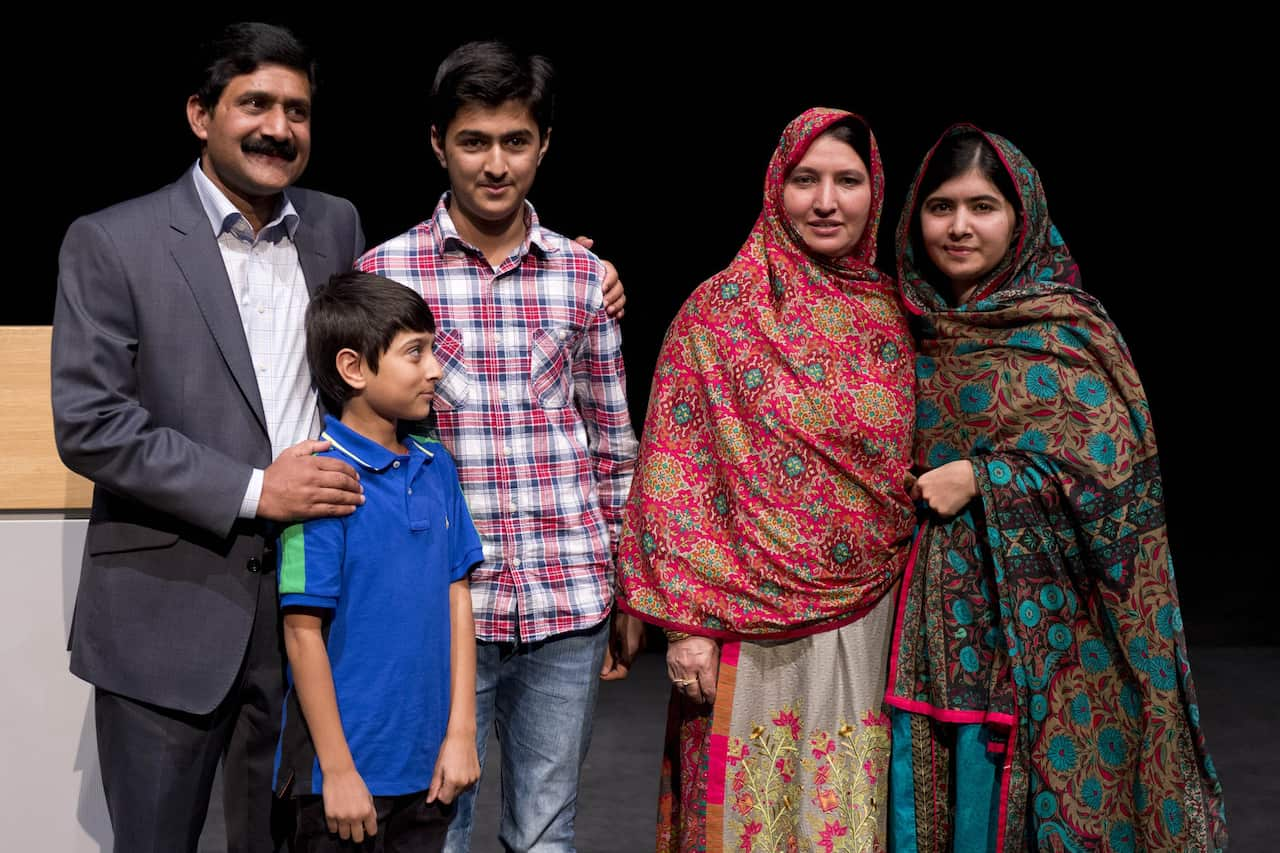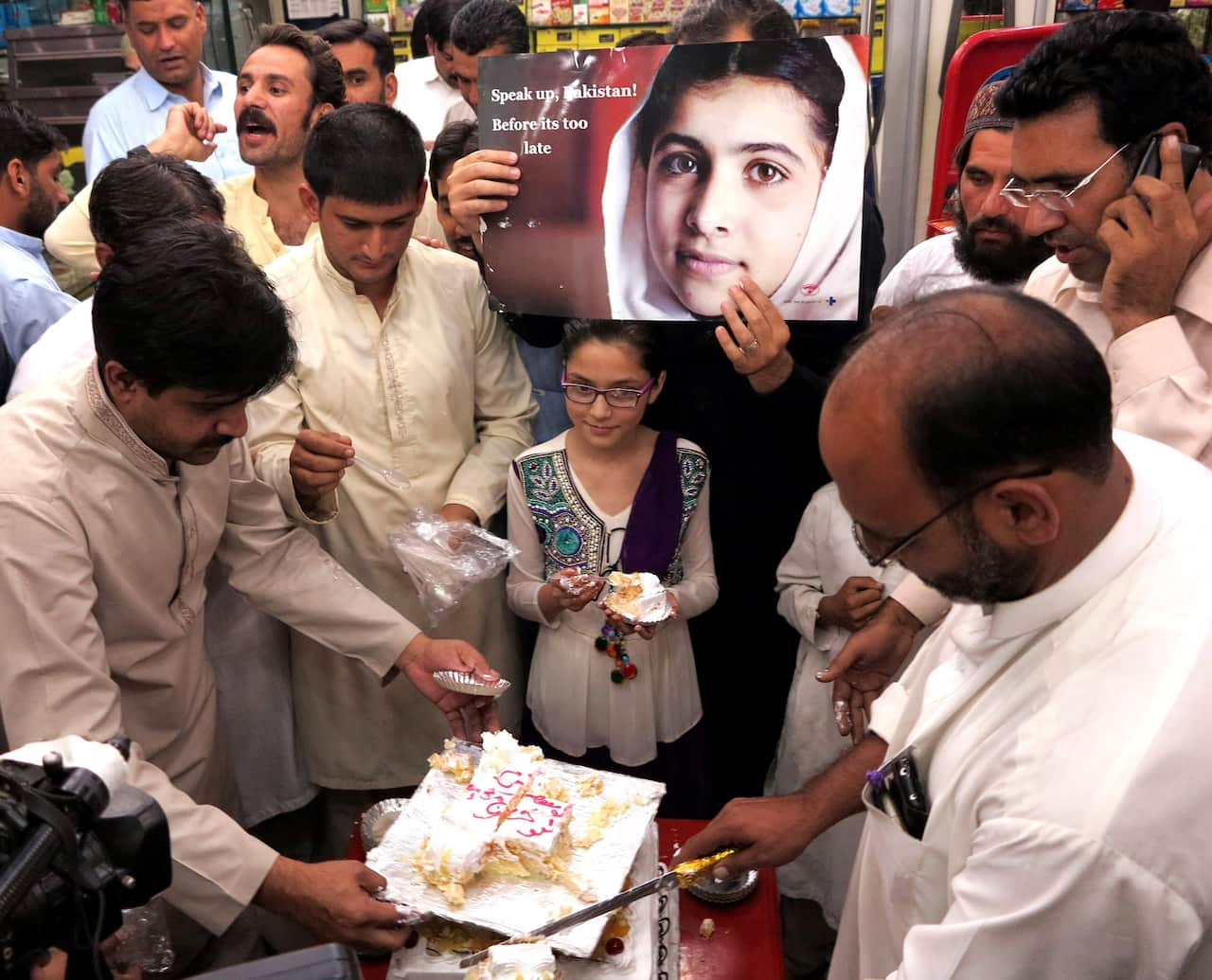Education rights campaigner Malala Yousafzai has dedicated her Nobel peace prize to "voiceless" children around the world, and called on the Indian and Pakistani prime ministers to attend the award ceremony for the sake of peace.
The 17-year-old, who heard the news while she was in a chemistry lesson at school in Birmingham, central England, said she was honoured to be the youngest person and the first Pakistani to receive the accolade.
"The award is for all the children who are voiceless, whose voices need to be heard," Malala told a press conference, held at the end of the school day so she wouldn't miss class.
Malala arrived in Britain from Pakistan for medical treatment after being shot in the head by a Taliban fighter in October 2012, an attempt to silence her vocal advocacy of the right of girls to go to school.
Standing on a box so she could reach the podium at Birmingham's main library, the teenager joked that winning the Nobel would not help her upcoming school exams.

But she told an audience that included her parents and two younger brothers: "I felt more powerful and more courageous because this award is not just a piece of metal or a medal you wear or an award you keep in your room.
"This is encouragement for me to go forward."
The Norwegian Nobel Committee gave the award to Malala and Indian activist Kailash Satyarthi for their struggle against the repression of children and young people and "for the right of all children to education".
Malala said she had already spoken to Satyarthi - she joked that she could not pronounce his name - to discuss how they could work together, and also try to reduce tensions between their two countries.
To that end, she urged Indian Prime Minister Narendra Modi and Pakistani Prime Minister Nawaz Sharif to attend the Nobel award ceremony in December.
"When the Taliban tried to silence her, Malala answered their brutality with strength and resolve."
The reaction in the streets of Birmingham, which has a large minority population of Pakistani origin, was also overwhelmingly positive.
"I like her. She's confident, speaking up for herself, for women," said 30-year-old Zara Hussain as she waited at a bus stop in Birmingham holding a baby.
"She could be president (of Pakistan) if she carries on."
But the global spotlight has provoked a backlash in parts of Pakistani society, with some accusing Malala of acting as a puppet of the West, while the Taliban have renewed the threat to her life.
Pakistanis celebrate the win
Joyful Pakistanis from the country's insurgency-wracked northwest are celebrating Malala Yousafzai's Nobel Peace Prize win with music, dance and cake, hailing her award as a victory for girls' education over Taliban violence.
Tributes for the 17-year-old, the youngest ever Nobel laureate, were led on Friday by Prime Minister Nawaz Sharif who called her the "pride of Pakistan", while dozens of people from her hometown Mingora gathered at the main intersection to chant slogans and exchange sweets.

Marjan Bibi, 11, cut a white pineapple cream cake donated by a local bakery as onlookers clapped and cheered: "Long Live Malala". Bibi said: "Malala is a source of pride for us. I will also write like Malala and will raise my voice for girls education when I will grow up."
Ayesha Khalid, who was at school with Malala, said: "It's not Malala alone winning this award, the girls of Pakistan have won it...(she) is the light of our eyes and the voice of our heart.
"She has proved that you can't put a halt to education by blowing up schools."
The teenager, who entered the public eye after writing a blog for the BBC's Urdu service about life under the Taliban during their 2007 - 2009 rule over the Swat Valley, was shot in the head by militants two years ago while on her way to school.
"She has proved that you can't put a halt to education by blowing up schools."
Since recovering, she has addressed the United Nations General Assembly, written a best-selling autobiography, and pushed Nigeria's Goodluck Jonathan to do more to free hundreds of girls kidnapped by Islamist militants.
Friday's jubilant celebrations at the Mingora intersection stood in stark contrast to the Taliban's period of rule when girls were prevented from going to school and people accused of breaking Sharia law were beheaded at a roundabout a few hundred metres away.
In the city of Peshawar, the capital of the northwest Khyber-Pakhtunkwa area that has borne the brunt of a decade-long Islamist insurgency against the state, some 200 people gathered at the press club to distribute sweets and dance to a powerful drum beat.
"The award given to the daughter of this soil Malala Yousufzai is not only a recognition of her achievements for the peace but it is also an acknowledgement of our sacrifices in the war against terror continuing for the last ten years," said provincial governor Mehtab Ahmed Khan.
Education activist Mosharraf Zaidi said Pakistan's government should use the goodwill around Malala's win to prioritise the country's long-neglected public school system.
"There are 52 million children aged five to sixteen in this country, of whom about 25 million are out of school," he said, adding the breakdown was some 14 million girls and 11 million boys.
"If Pakistan cannot take advantage of this moment of a Pakistani winning the Nobel Prize because she is a campaigner for education and because she is so incredibly brave, then it'll represent yet another missed opportunity and also a tragedy," he added.
Praise from Obama
US President Barack Obama has hailed the "passion and determination" of teen Nobel peace laureate Malala Yousafzai, who shared the prize with Indian anti-child labour activist Kailash Satyarthi.
"At just 17 years old, Malala Yousafzai has inspired people around the world" with her efforts to ensure all girls can get an education, Obama said in a statement on Friday.
"When the Taliban tried to silence her, Malala answered their brutality with strength and resolve," he said, adding that he and his wife Michelle was "awe-struck by her courage" after a meeting in the Oval Office last year.
Obama said the honour bestowed upon Malala - the youngest Nobel laureate ever - and Satyarthi "reminds us of the urgency of their work to protect the rights and freedoms of all our young people."
"The true measure of Kailash's efforts is not a single prize he has been awarded, but the tens of thousands of people who today live with freedom and dignity thanks to his efforts," Obama said.
The US leader noted that the two laureates come from different countries, religions and generations but "share an unyielding commitment to justice and an unshakeable belief in the basic dignity of every girl and boy."
"Even as we celebrate their achievements, we must recommit ourselves to the world that they seek - one in which our daughters have the right and opportunity to get an education; and in which all children are treated equally," he said.

